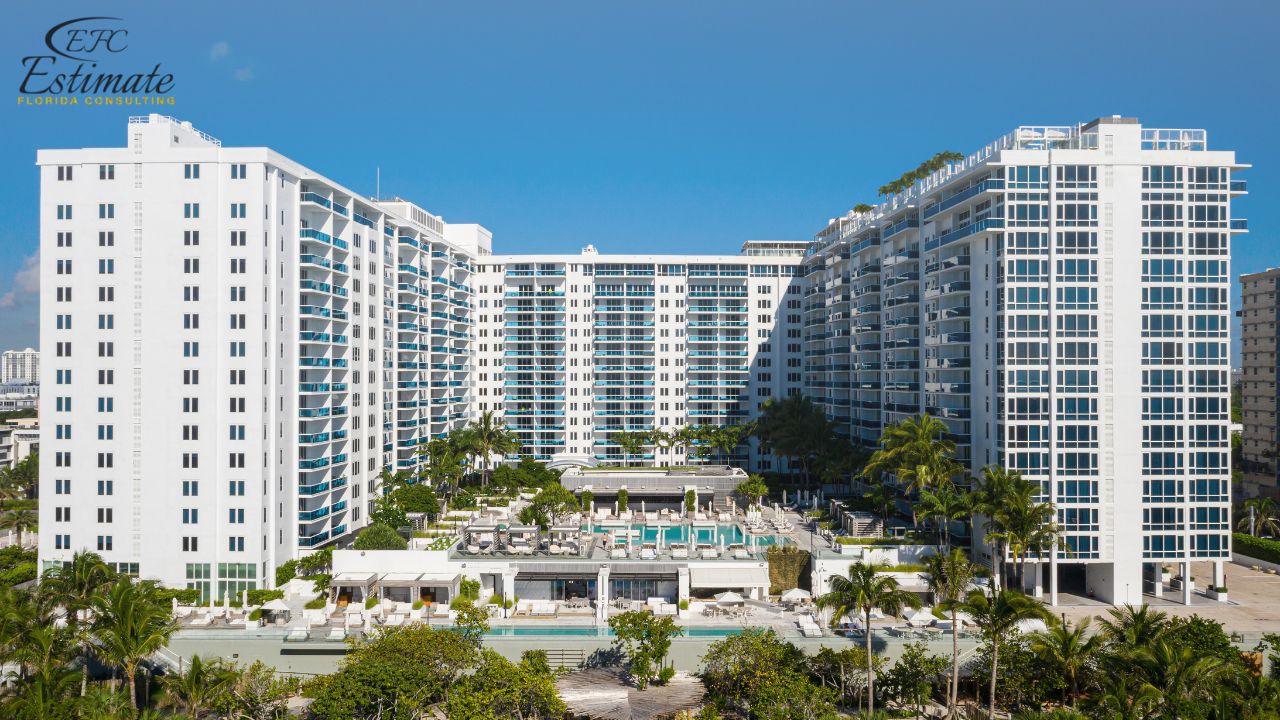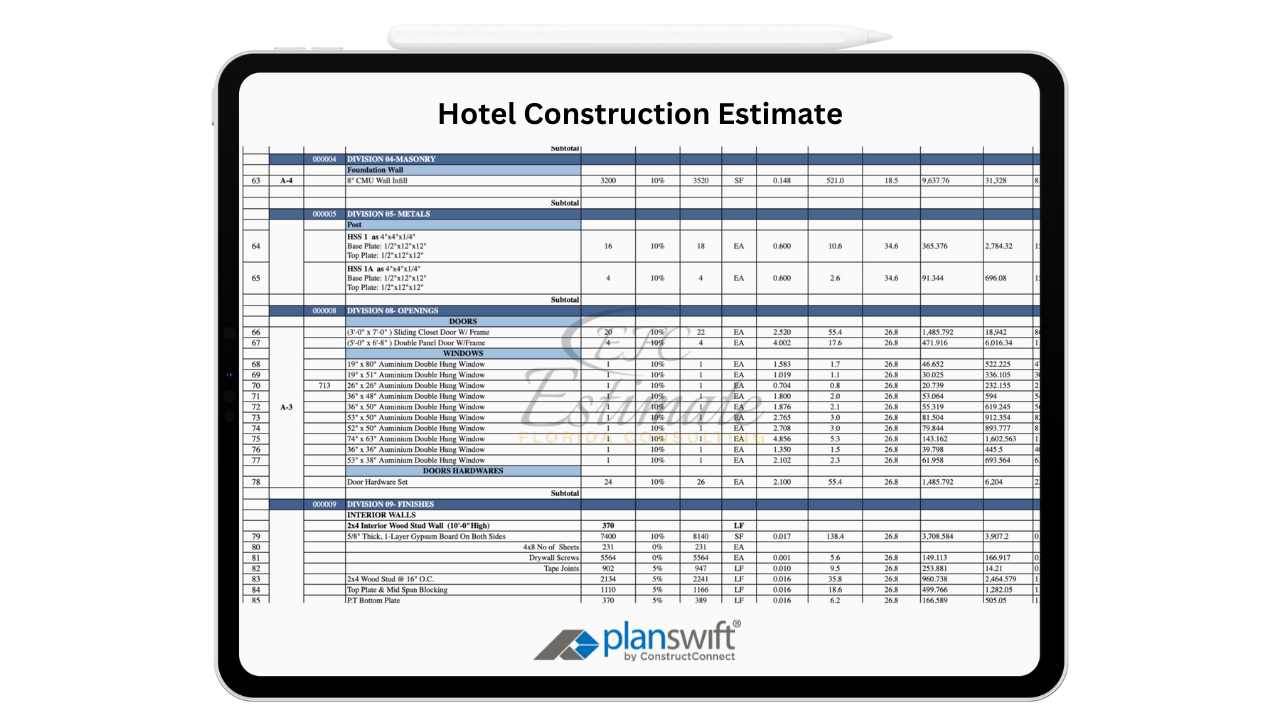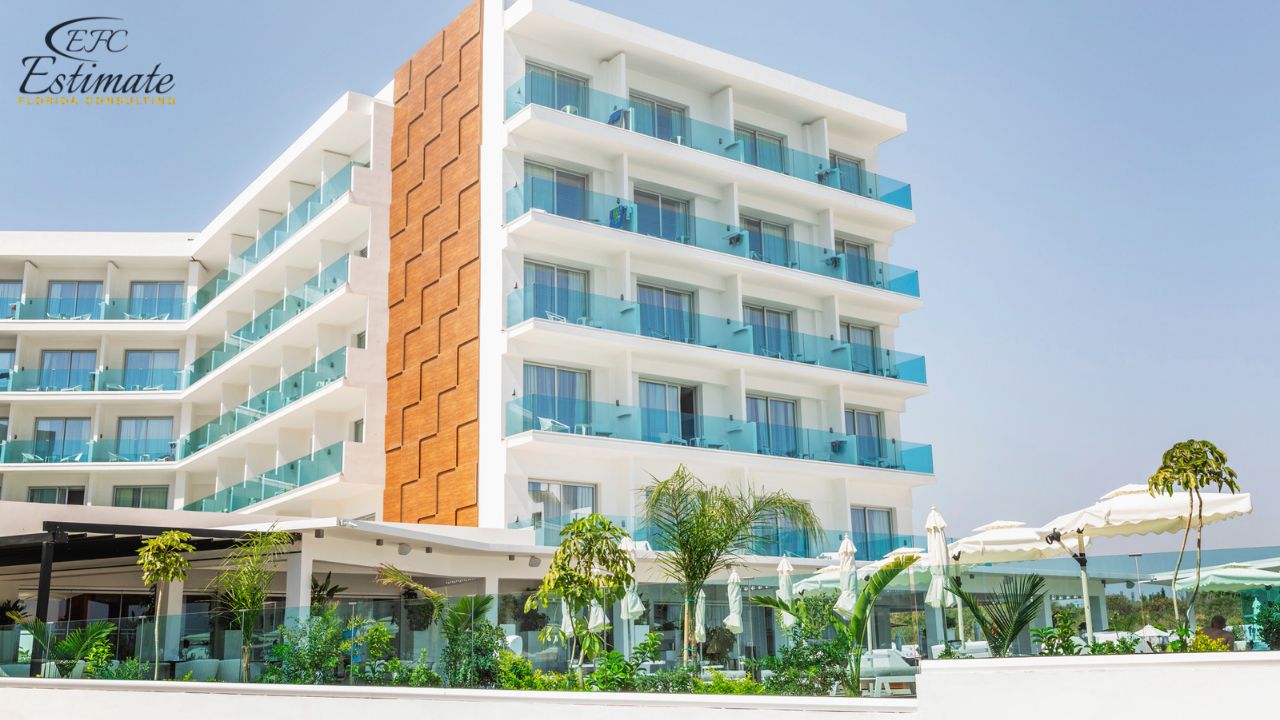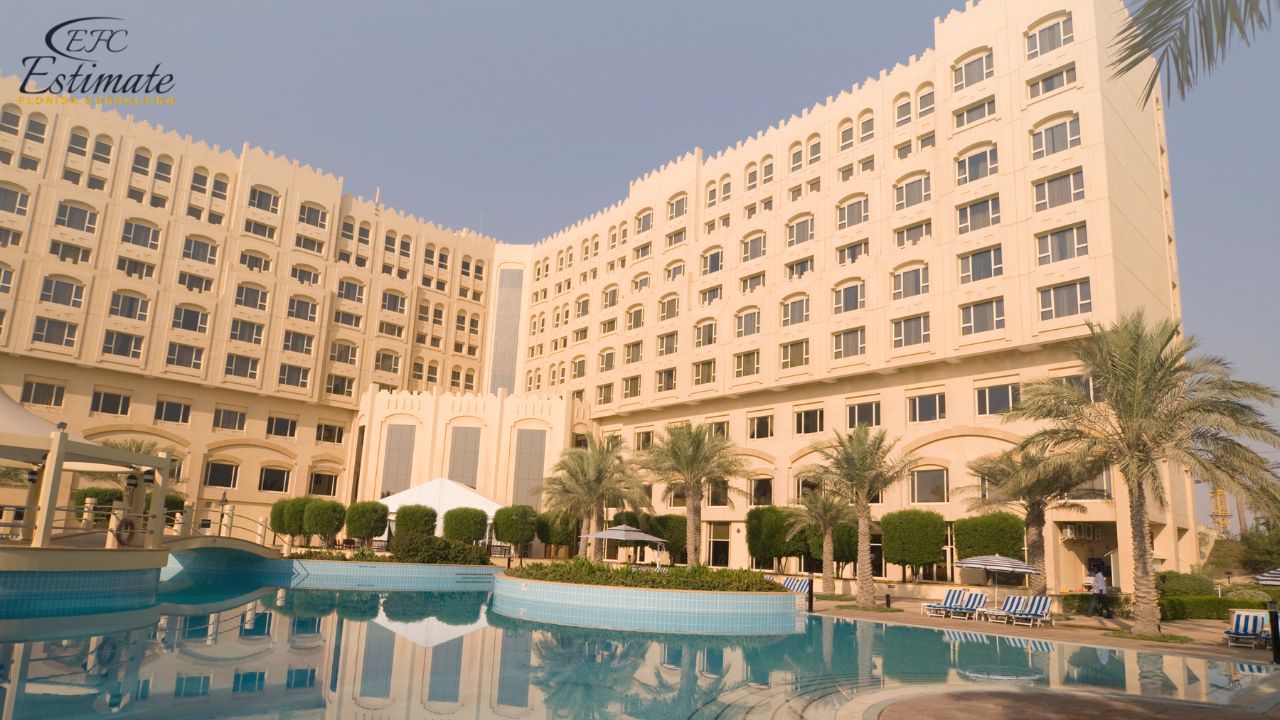- Homepage
- Construction in Naples
Hotels Building Construction in Naples
Leading provider of hotels building construction services.
Building a hotel in Naples taps into the city’s thriving tourism industry, fueled by its upscale lifestyle, pristine beaches, and reputation as a premier destination for luxury travelers. From boutique waterfront retreats to expansive five-star resorts, hotel construction in Naples blends elegance, resilience, and guest-focused design. Costs are driven by prime real estate, hurricane-ready materials, and high-end amenities that cater to Naples’s discerning visitors. At Estimate Florida Consulting, we provide tailored estimates to navigate this dynamic market.

What Drives Hotels Building Construction Costs in Naples?
Naples’s hotel construction costs hinge on its coastal allure and tourist demands. Land in prime areas like Downtown Naples or beachfront locations fetches $100 – $300 per sq. ft., while suburban areas may range from $40 – $120 per sq. ft. Hurricane codes mandate reinforced concrete, impact glass, and elevated designs, adding 10-20% to expenses. Labor averages $30 – $45/hour amid skilled worker shortages, and premium materials like corrosion-resistant steel are essential for coastal durability. Hotels require guest-centric features—lobbies, pools, spas, and smart tech—pushing costs from $250 to $500 per sq. ft.
Hotels Construction Cost per Square Foot in Naples
Hotel costs per square foot in Naples vary by scale and luxury level. Boutique hotels start at $250 – $300 per sq. ft. with simpler designs, while high-rise resorts hit $400 – $500 per sq. ft. with premium finishes and extensive systems. These figures reflect Naples’s need for durable builds and guest appeal, excluding land acquisition. Here’s a snapshot:
Hotel Type | Cost Per Sq Ft | Key Cost Drivers |
Boutique Hotel | $250 – $300 | Art Deco retrofits, compact layouts |
Mid-Scale Hotel | $300 – $350 | Pools, dining, moderate finishes |
Luxury Hotel | $350 – $400 | Spas, upscale interiors, smart tech |
High-Rise Resort | $400 – $500 | Towers, luxury amenities, ocean views |
90% More Chances to Win Projects With Our Estimate!
- Multi-Family Building
- Hotel Building
- Hospital Building
- Warehouse Building
- School & University Building
- High-Rise Building
- Shopping Complex
- Data Center Building

Hotels Building Cost Construction in Naples
Here’s a table outlining Naples’s hotel construction costs:
Hotel Type | Size (Square Feet) | Cost Range (Total) | Cost Per Sq Ft | Construction Timeline |
Boutique Hotel | 20,000 – 50,000 | $5M – $15M | $250 – $300 | 12-18 months |
Mid-Scale Hotel | 60,000 – 100,000 | $18M – $35M | $300 – $350 | 18-24 months |
Luxury Hotel | 120,000 – 200,000 | $40M – $80M | $350 – $400 | 24-36 months |
High-Rise Resort | 250,000 – 400,000 | $100M – $200M | $400 – $500 | 36-60+ months |
Hotels Building Construction Detailed Breakdown in Naples
Hotel construction in Naples encompasses diverse projects, from boutique hotel renovations in historic districts to luxury beachfront resorts. Each project follows a structured development process, including land acquisition, design, permitting, site preparation, structural work, MEP (mechanical, electrical, plumbing) installations, interior finishes, and final inspections. Costs range from $250 to $800 per square foot, influenced by factors such as location, materials, labor, and high-end amenities like pools, spas, and rooftop bars. Naples-specific considerations include hurricane-resistant construction, strict building codes, and sustainable design trends to meet LEED certification standards. Additionally, hotels often integrate modern smart technology for energy efficiency and guest convenience.

Size & Scope
- Square Footage: Boutique hotels cover 20,000 – 50,000 sq ft with 50-100 rooms averaging 300-400 sq ft each, while high-rise resorts stretch to 250,000 – 400,000 sq ft with 200-500 rooms, including suites, ballrooms, and retail spaces to maximize revenue streams.
- Total Cost Range: Boutique hotels range from $5M – $15M with focused designs, mid-scale hotels $18M – $35M with broader appeal, luxury hotels $40M – $80M with high-end finishes, and high-rise resorts $100M – $200M with expansive facilities, reflecting Naples’s premium tourism-driven market.
- Examples: A 30,000 sq ft boutique with 60 rooms, a rooftop bar, and valet parking; a 80,000 sq ft mid-scale hotel with 150 rooms, a pool deck, and all-day dining; a 150,000 sq ft luxury hotel with 250 rooms, a spa, and oceanfront terraces; or a 300,000 sq ft resort with 400 rooms, a marina, convention center, and multiple restaurants.
Construction Phases & Costs
- Site Preparation ($300K – $3M): Boutique hotels require clearing, grading, and basic drainage ($300K – $600K) on smaller urban lots, while resorts demand extensive excavation, deep pilings for sandy soil, and stormwater vaults ($2M – $3M) to handle Naples’s coastal conditions and seasonal heavy rainfall.
- Foundation ($600K – $12M): Small hotels use reinforced slabs ($600K – $1.2M) for low-rise stability, while high-rises need deep pilings (80-120 ft at $40 – $60/ft) or caissons drilled into limestone ($8M – $12M) to support towers in Naples’s high water table and flood-prone areas near the Intracoastal Waterway.
- Structure ($2M – $40M): Boutique hotels rely on concrete frames with flat roofs ($2M – $4M) for efficiency, while resorts use wide-span steel with concrete cores and hurricane bracing ($20M – $40M), meeting Palm Beach County’s 175 mph wind codes with added roof tie-downs for safety.
- Interior Finishes ($1M – $15M): Boutique hotels feature stylish lobbies with tile floors and basic room finishes ($1M – $2M), while resorts add marble cladding, custom suites with wet bars, and high-end decor ($10M – $15M) to compete in Naples’s luxury market.
- Infrastructure ($800K – $15M): Small hotels need standard HVAC, plumbing for 50-100 rooms, and basic electrical ($800K – $1.5M), while resorts require high-capacity systems, multiple elevators, and advanced wiring for smart tech ($10M – $15M) to serve hundreds of guests.
- Amenities ($500K – $20M): Boutique hotels offer rooftop bars or small pools ($500K – $1M), while resorts include spas with saunas, multi-concept restaurants, and marinas with docking ($15M – $20M) to attract Naples’s affluent travelers.
- Soft Costs ($400K – $8M): Boutique hotels need permits and design plans ($400K – $900K), while resorts face zoning variances, FAA height approvals near Naples Airport, and environmental reviews ($5M – $8M) due to coastal regulations.
Naples-Specific Details
- Hurricane Prep: Impact glass, reinforced doors, and backup generators add $200K – $6M, with resorts requiring full power redundancy for 185 mph winds (2025 codes), vital for guest safety and uninterrupted service during Naples’s stormy season.
- Cooling Systems: High-efficiency HVAC with dehumidification costs $600K – $8M to tackle Naples’s 70-90% humidity, ensuring guest comfort in a climate where summer highs hit 90°F+ and cooling runs year-round.
- Sustainability: Solar panels, water recycling, and LEED-certified designs add $400K – $3M, appealing to eco-conscious travelers and cutting operational costs in Naples’s sun-soaked environment, a growing trend in 2025.
- Timeline: Boutique hotels take 12-18 months with streamlined builds, while resorts span 36-60+ months due to scale and complexity, with delays from rain (June-November) or permitting in tourist-heavy zones like South Beach or the Art Deco District.
Example Projects
- Boutique: A 30,000 sq ft hotel with 60 rooms and a rooftop bar costs $8M – $10M (15 months).
- Resort: A 300,000 sq ft high-rise with 400 rooms, a marina, and convention space costs $120M – $150M (48 months).
3D Rendering Cost for Hotels Building in Naples
3D rendering costs for hotels in Naples range from $800 – $2,500 for basic exteriors showcasing iconic facades, $3,500 – $15,000 for photorealistic interiors with guest rooms and amenities, and $20,000+ for VR tours highlighting ocean views or rooftop pools. These visuals, critical for investor pitches and pre-sales in Naples’s competitive market, reflect the city’s emphasis on stunning design as of 2025.
For Hotel Buildings and Other Projects
Turnaround time is 1-2 days.
Win More Projects With Us
Naples-Specific Considerations for Hotel Construction
Naples’ distinctive environment introduces several factors that influence hotel construction planning and costs, necessitating customized strategies to address operational needs and regulatory requirements.
- Hurricane Preparedness – Hotels must be built with reinforced concrete frameworks, impact-resistant windows and doors (e.g., PGT WinGuard), and stormproof designs to endure hurricanes, increasing construction costs by 10-20% to ensure guest safety and operational continuity during storm events like Hurricane Ian (2022).
- Flood Zones – Properties near the Gulf of Mexico or inland waterways like the Gordon River require elevated foundations, advanced drainage systems with retention basins, and waterproofing measures to mitigate flood risks, protecting essential areas such as lobbies, kitchens, and mechanical systems.
- Permitting Challenges – Naples enforces stringent zoning laws, Collier County building codes, and environmental regulations, including those tied to the city’s Coastal Construction Control Line, often prolonging project timelines and raising costs for hotel developments designed to harmonize with the area’s luxurious, natural ambiance.
- Labor Availability – The strong demand for skilled construction workers in Southwest Florida, fueled by simultaneous luxury residential, commercial, and hospitality projects, can drive up labor costs and lead to potential delays, particularly for sophisticated hotel designs featuring intricate architectural details.
Sustainable Hotel Construction Trends in Naples
Sustainability is increasingly a priority in Naples’ hotel construction sector, blending luxury hospitality with environmental responsibility to cater to eco-conscious travelers and the community’s high standards.
- Energy Efficiency – Incorporating LED lighting, rooftop solar panels, and high-efficiency HVAC systems reduces long-term operational expenses, enhancing energy performance and lowering utility costs for hotel operators.
- Green Materials – Utilizing recycled steel, low-VOC paints, and insulated concrete forms minimizes the environmental impact while improving structural durability and enhancing indoor air quality for guests and staff.
- Water Management – Rainwater harvesting systems, permeable landscaping designs, and water-efficient fixtures address Naples’ seasonal rainfall and proximity to the Gulf, reducing water waste and promoting sustainable practices in a region celebrated for its natural coastal landscapes.
These sustainable approaches may raise initial construction costs by 5-15%, yet they offer significant long-term savings, elevate guest satisfaction, increase property values, and may qualify for tax incentives. This movement also strengthens Naples’ dedication to environmental stewardship, appealing to a clientele that values both luxurious stays and ecological innovation.
Construction Timeline Expectations for Hotels in Naples
Understanding timelines is essential for effective planning and budgeting of hotel construction projects in Naples:
- Small Hotels (Up to 20,000 sq. ft.) – Typically 8-14 months, depending on design intricacy and site-specific conditions, such as proximity to the Gulf of Mexico or residential areas like Old Naples.
- Mid-Size Hotels (20,000-50,000 sq. ft.) – 14-24 months, accounting for permitting processes, site preparation, and requirements like enhanced drainage near locations such as the Gordon River or Gulf Shore Boulevard.
- Large Hotels (>50,000 sq. ft.) – 24-36+ months, particularly for projects featuring luxury amenities, multi-story layouts, or hurricane-resistant features common in Naples’ upscale hospitality sector.
Naples-Specific Factors: Rigorous zoning regulations under Collier County codes, hurricane-resistant construction mandates (e.g., impact-resistant windows and reinforced frameworks), flood zone mitigation near coastal or waterway-adjacent sites, and high demand for skilled labor in Southwest Florida can extend timelines by 3-6 months. Early collaboration with contractors, architects, and the Naples Community Development Department ensures smoother progress and adherence to local safety and environmental standards.
90% More Chances to Win Hotel Bids with Our Estimate
Additional Construction Details in Naples
Material Choices
- Concrete: Precast or poured-in-place at $160 – $220 per cubic yard for storm resistance and durability in Naples’s humid, salty conditions.
- Steel: Galvanized at $1,600 – $2,200 per ton to resist coastal corrosion, essential for high-rise frames and longevity.
- Roofing: Metal or TPO systems at $12 – $20 per sq. ft., designed for hurricane winds and Naples’s intense UV exposure.
Design Considerations
- Orientation: Ocean-facing rooms are a top priority, offering breathtaking views and ample natural light, which enhance guest satisfaction and justify premium pricing. Strategic placement of balconies and floor-to-ceiling windows maximizes visibility while minimizing glare and heat gain.
- Ventilation: Advanced HVAC systems with HEPA filters and dehumidifiers ensure superior indoor air quality while reducing humidity-related damage. Energy-efficient models with smart sensors optimize airflow, cutting cooling costs by 15-25%—a critical factor in Naples’s warm climate.

- Safety: Naples’s stringent building codes require fire-rated materials, impact-resistant glass, and hurricane-grade storm shutters. Reinforced glazing protects against extreme weather, while automated safety systems enhance guest security and regulatory compliance.
Land Acquisition Costs
- Urban Naples: $100 – $300 per sq ft (e.g., $10M – $30M for 100,000 sq ft) in tourist hubs like South Beach or the Art Deco District, reflecting high demand.
- Suburban Areas: $40 – $120 per sq ft in areas near North Beach or Mid-Beach, ideal for larger footprints with lower land costs.
Contingency & Extras
- Buffer: 15-20% ($750K – $40M) for delays or material price spikes (e.g., steel up 20% in 2025 due to global supply shifts).
- Premium Features: Rooftop infinity pools, smart-room automation, or private beach access add $5M – $15M, boosting guest appeal.
Role of Professionals for Hotels Building Construction in Naples
- Contractors: Oversee the entire hotel construction project, ensuring quality work, managing materials, labor, and timelines while adhering to safety regulations. Hiring experienced contractors ensures a smooth and efficient project.
- Subcontractors: Specialize in essential tasks such as electrical systems, plumbing, HVAC installation, and interior finishes to ensure durability, comfort, and efficiency. Hire Skilled subcontractors are crucial for high-quality execution.
- Architects: Design aesthetically appealing, functional, and energy-efficient hotel layouts that enhance guest experience while meeting safety and accessibility standards. Hire Professional architects create visually striking and practical hotel designs.
- Engineers: Ensure the structural integrity, safety, and efficiency of the hotel by planning and overseeing mechanical, electrical, and civil aspects. Hire Expert engineers guarantee a strong, sustainable, and cost-effective building.
- Construction Estimators: Provide accurate cost assessments for materials, labor, and project timelines to help optimize budget planning and prevent cost overruns. Hire professional estimators to ensure financial efficiency and project feasibility.
Why Partner with Estimate Florida Consulting for Hotels Building Construction in Naples?
At Estimate Florida Consulting, we bring unmatched expertise to Naples’s hotel construction challenges:
- Precise estimates tailored to your project’s scale, style, and Naples’s unique market dynamics.
- Deep knowledge of hurricane codes, zoning intricacies, and hospitality trends shaping the city’s skyline.
- Consultations to refine your vision—call 561-530-2845 to launch your project with confidence.
Conclusion
Hotel construction in Naples ranges from $5M for a boutique property to $200M for a high-rise resort, driven by prime land values, durable materials, and the city’s insatiable tourism appetite. With meticulous planning, you can craft a hotel that shines in this global destination, whether it’s a chic retreat or a sprawling luxury complex. Contact Estimate Florida Consulting for a custom estimate rooted in 2025 market insights, and let’s build Naples’s next hospitality icon together!
Question Answer
Frequently Asked Question
Hotel construction is the process of designing and building a facility to provide lodging and services for guests. It involves site selection, architectural design, permitting, and construction, including foundation, framing, utilities, and interior finishing. It focuses on guest comfort, safety, and efficiency, adhering to local codes and regulations, with timelines and costs varying by size, location, and complexity.
The "hotel concept" typically refers to the foundational elements that define a hotel’s identity, purpose, and operational framework. While interpretations may vary, here are seven common components often considered essential to a hotel concept:
- Target Market – Identifies the primary guests the hotel aims to attract, such as business travelers, luxury seekers, families, or budget-conscious tourists, shaping its design and services.
- Location – The hotel’s geographic setting, whether urban, coastal, or resort-based (e.g., Boca Raton’s upscale coastal vibe), influencing accessibility, ambiance, and construction considerations.
- Design and Theme – The architectural style and interior aesthetic (e.g., modern, boutique, or eco-friendly), creating a unique guest experience and visual identity.
- Amenities and Services – Key offerings like pools, spas, restaurants, or conference rooms, tailored to meet guest expectations and enhance their stay.
- Sustainability – Incorporation of eco-friendly practices, such as energy-efficient systems or green materials, reflecting environmental responsibility and appealing to conscious travelers.
- Brand Identity – The hotel’s name, reputation, and market positioning (e.g., luxury chain or independent boutique), driving marketing and guest loyalty.
- Operational Model – The management and service structure, such as full-service, limited-service, or extended-stay, determining staffing, costs, and guest interaction.
These components work together to create a cohesive vision, ensuring the hotel meets both guest needs and business goals.
A rough estimate for a standard 100-room hotel in a suburban area, like a 3-star property, is $15 million to $32 million, with $22 million as a midpoint. For a precise figure, you’d need to specify location, hotel class, and amenities, then consult local contractors or estimators. Costs also fluctuate with market conditions, such as labor shortages or material prices, which have risen since 2020.
Hotel Construction Planning Steps
- Feasibility Study & Market Research – Analyze demand, location, zoning laws, and competition.
- Budgeting & Financing – Estimate costs, secure funding, and plan contingencies.
- Concept & Design – Define theme, plan layout, ensure compliance, and design amenities.
- Permits & Planning – Obtain necessary approvals, set timelines, and hire project managers.
- Contracting & Procurement – Select contractors, procure materials, and finalize suppliers.
- Construction Phase – Site preparation, structural work, installations, and finishing.
- Pre-Opening Setup – Hire staff, install hotel management systems, and launch marketing.
Final Inspection & Opening – Ensure compliance, conduct soft opening, and host a grand launch.
The "Big Five" in a hotel typically refer to the five key departments that ensure smooth operations and guest satisfaction. These are:
- Front Office (Reception & Reservations) – Handles check-in, check-out, guest inquiries, and reservations.
- Housekeeping – Maintains cleanliness, room servicing, and laundry operations.
- Food & Beverage (F&B) – Manages restaurants, bars, room service, and banquet events.
- Maintenance & Engineering – Ensures proper functioning of electrical, plumbing, HVAC, and safety systems.
Sales & Marketing – Drives bookings through advertising, promotions, and partnerships.
The Housekeeping Department is typically the largest department in a hotel. It requires the most staff as it is responsible for:
- Cleaning and maintaining guest rooms and public areas
- Laundry services (bedsheets, towels, uniforms, etc.)
- Stocking and managing cleaning supplies
- Coordinating with the front office for room readiness
Since housekeeping operates 24/7 in larger hotels, it usually has the highest number of employees.
- Electrical
- Plumbing
- Masonry
- Roofing
- Painting
- More

